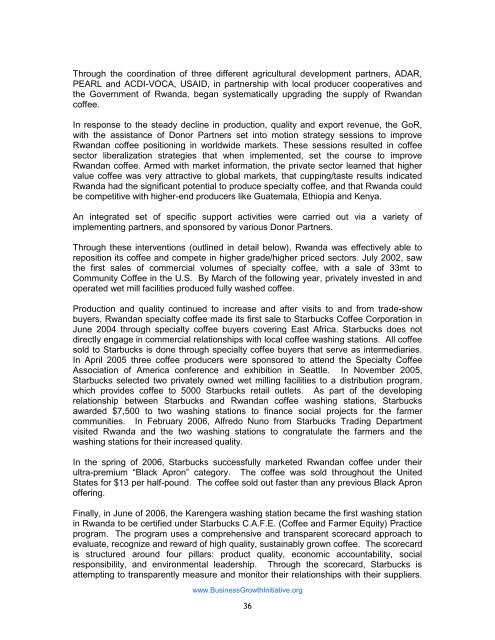the ties that bind - Economic Growth - usaid
the ties that bind - Economic Growth - usaid
the ties that bind - Economic Growth - usaid
You also want an ePaper? Increase the reach of your titles
YUMPU automatically turns print PDFs into web optimized ePapers that Google loves.
Through <strong>the</strong> coordination of three different agricultural development partners, ADAR,<br />
PEARL and ACDI-VOCA, USAID, in partnership with local producer cooperatives and<br />
<strong>the</strong> Government of Rwanda, began systematically upgrading <strong>the</strong> supply of Rwandan<br />
coffee.<br />
In response to <strong>the</strong> steady decline in production, quality and export revenue, <strong>the</strong> GoR,<br />
with <strong>the</strong> assistance of Donor Partners set into motion strategy sessions to improve<br />
Rwandan coffee positioning in worldwide markets. These sessions resulted in coffee<br />
sector liberalization strategies <strong>that</strong> when implemented, set <strong>the</strong> course to improve<br />
Rwandan coffee. Armed with market information, <strong>the</strong> private sector learned <strong>that</strong> higher<br />
value coffee was very attractive to global markets, <strong>that</strong> cupping/taste results indicated<br />
Rwanda had <strong>the</strong> significant potential to produce specialty coffee, and <strong>that</strong> Rwanda could<br />
be competitive with higher-end producers like Guatemala, Ethiopia and Kenya.<br />
An integrated set of specific support activi<strong>ties</strong> were carried out via a variety of<br />
implementing partners, and sponsored by various Donor Partners.<br />
Through <strong>the</strong>se interventions (outlined in detail below), Rwanda was effectively able to<br />
reposition its coffee and compete in higher grade/higher priced sectors. July 2002, saw<br />
<strong>the</strong> first sales of commercial volumes of specialty coffee, with a sale of 33mt to<br />
Community Coffee in <strong>the</strong> U.S. By March of <strong>the</strong> following year, privately invested in and<br />
operated wet mill facili<strong>ties</strong> produced fully washed coffee.<br />
Production and quality continued to increase and after visits to and from trade-show<br />
buyers, Rwandan specialty coffee made its first sale to Starbucks Coffee Corporation in<br />
June 2004 through specialty coffee buyers covering East Africa. Starbucks does not<br />
directly engage in commercial relationships with local coffee washing stations. All coffee<br />
sold to Starbucks is done through specialty coffee buyers <strong>that</strong> serve as intermediaries.<br />
In April 2005 three coffee producers were sponsored to attend <strong>the</strong> Specialty Coffee<br />
Association of America conference and exhibition in Seattle. In November 2005,<br />
Starbucks selected two privately owned wet milling facili<strong>ties</strong> to a distribution program,<br />
which provides coffee to 5000 Starbucks retail outlets. As part of <strong>the</strong> developing<br />
relationship between Starbucks and Rwandan coffee washing stations, Starbucks<br />
awarded $7,500 to two washing stations to finance social projects for <strong>the</strong> farmer<br />
communi<strong>ties</strong>. In February 2006, Alfredo Nuno from Starbucks Trading Department<br />
visited Rwanda and <strong>the</strong> two washing stations to congratulate <strong>the</strong> farmers and <strong>the</strong><br />
washing stations for <strong>the</strong>ir increased quality.<br />
In <strong>the</strong> spring of 2006, Starbucks successfully marketed Rwandan coffee under <strong>the</strong>ir<br />
ultra-premium “Black Apron” category. The coffee was sold throughout <strong>the</strong> United<br />
States for $13 per half-pound. The coffee sold out faster than any previous Black Apron<br />
offering.<br />
Finally, in June of 2006, <strong>the</strong> Karengera washing station became <strong>the</strong> first washing station<br />
in Rwanda to be certified under Starbucks C.A.F.E. (Coffee and Farmer Equity) Practice<br />
program. The program uses a comprehensive and transparent scorecard approach to<br />
evaluate, recognize and reward of high quality, sustainably grown coffee. The scorecard<br />
is structured around four pillars: product quality, economic accountability, social<br />
responsibility, and environmental leadership. Through <strong>the</strong> scorecard, Starbucks is<br />
attempting to transparently measure and monitor <strong>the</strong>ir relationships with <strong>the</strong>ir suppliers.<br />
www.Business<strong>Growth</strong>Initiative.org<br />
36

















